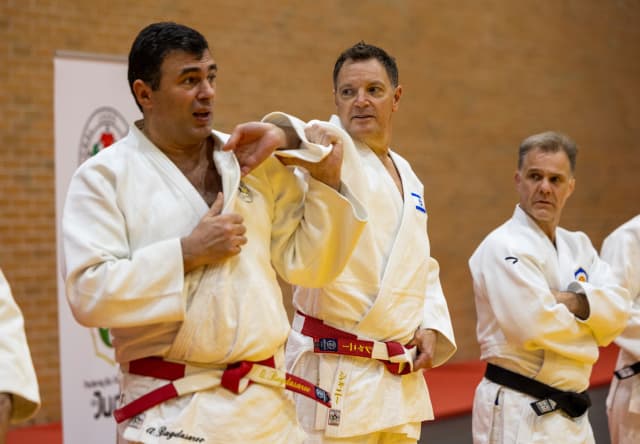As a dynamic Olympic sport, judo is in continuous development. Therefore, competition rules have to adapt to the athletes' performances in respect of the traditions and values of the sport, while taking into account what is going on, on the mat.
Usually, between two Olympic Games, there is a period of four years which follows a clear structure, known and accepted by everyone involved at the competition level. Thus the first year is dedicated to the rules update. The first part of the second year, the Olympic qualification starts, and for the next 24 months, athletes, coaches, referees and national federations concentrate on winning necessary results and points to ensure qualification for the Olympic Games and to claim one of the top eight seeded positions in each weight category.
The last cycle was massively disturbed due to the worldwide pandemic situation. The visible consequence was that the Olympic Games Tokyo 2020 took place in 2021. If this might sound insignificant, it had concrete consequences on the current Olympic cycle. The Olympic qualification began in the first part of 2022 and the testing period was therefore shortened.
The Gyor seminar just held in Hungary was designed to answer all the questions that everyone may have when it comes to refereeing, sport and education. For the IJF in co-operation with EJU, it was important to take the time to discus and analyse before the first events of the World Judo Tour took place.
To give the possibility to cover all areas, the seminar was divided into four sessions. "We started on Saturday morning with a session specifically on refereeing and continued in the afternoon with a session on sport and education matters. On Sunday two more sessions for refereeing took place," explained Florin Daniel Lascau, IJF Head Refereeing Director, before adding, "The refereeing subjects were divided into three groups. In the first group we evaluated the ippon and waza-ari scores, in the second group we identified key points of the small penalties, shido, and we concluded with the third group, where major penalties, hansokumake, were deeply analysed."
The chapter of scores (8 groups) presented the differences between ippon and waza-ari, the evaluation of side landings, upper back landings, continuation of throws, control, roll over actions, the evaluation of attacks and counter attacks, and finally the possible scoring in tachi-waza vs ne-waza situations.
The shido chapter (7 groups) was divided into breaking and avoiding grips, forbidden grips, unconventional grips, the differences between pulling down and defensive posture, the evaluation of attacks vs false attacks, the application of kansetsu-waza starting in tachi-waza (without additional throwing techniques), and the situations of stretching legs.
The Last chapter focused on hansoku make (7 groups), where judo safety has been prioritised: tori diving or using the head to throw, uke avoiding falling using head defence or bridge, the applications of kansetsu-waza in addition with throwing techniques, uke reaping tori’s standing leg, the application of kata-sankaku and ushiro-sankaku, finishing with miscellaneous hansoku make situations.
The importance and priority of the seminar in this Olympic year was demonstrated by the participation of over 240 delegates, representing 67 national judo federations. The interaction was very positive and the questions and solutions presented by the IJF and EJU but also the feedback from the delegates presented in the “Richter Concert and Conference Hall” of Gyor was more than valuable. Symbolically and practically, all participants were dressed in white judogi. The seminar was a milestone in the development of world judo.
The seminar aimed, in an educational way, to review the current refereeing rules. For each point of the agenda, video examples of what is allowed and what is not, as well as of border situations were used. "Watching the videos together, taking into consideration the current refereeing rules, breaking down the actions, but also paying attention to the grips, the place on the mat, the time, the action of the blue and white competitor in a given situation, the Kodokan classification of judo techniques, safety aspects, continuation, landings and ethics, created a good atmosphere for the discussions. The added value was great and brought all participants together in recognising, analysing and evaluating the current judo in competition.
We were very proud and honoured to have the presence and observations of the IJF President, Mr Marius Vizer, the EJU And Hungarian Judo Association President, Dr Laszlo Toth, and the opening speech of Dr Dezsi, Mayor of Gyor, 7th dan in judo,” said Florin Daniel Lascau. The list of judo personalities continued with Mr Jean-Luc Rougé, Mr Juan-Carlos Barcos, presidents of national federations, such as Mrs Sanda Corak and Mr Sezer Huysuz, and IJF Academy representatives, Mr Envic Galea and Dr Tibor Kozsla.
Modern judo comes from different judo schools with different judo backgrounds. A good understanding of judo techniques and judo rules is the minimum requirement worldwide. The IJF Academy has here a major impact in implementing judo knowledge throughout the five continents. Nevertheless, the performances and actions of the athletes have to be evaluated according to the current rules, with responsibility, fairness and transparency, in order to ensure that we will have the correct medallists during World Judo Tour events, at the world championships and at the Olympic Games in Paris. The Seminar was the key moment of this start of the season, to achieve that ambitious and realistic goal.
Source: Florin Daniel Lascau, IJF Head Refereing Director





